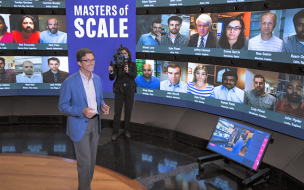Online programs have exploded, prompted by the rise of innovative online learning companies like Coursera or edX and the growing appetite for digital degrees from young managers who are questioning the cost and value of a campus course.
But what is the future of online learning? Will the university as we know it be upended by tech-savvy challengers? Will MBA students study from their sofas instead of multi-million dollar bricks-and-mortar facilities?
Alison Watson, program leader and business lecturer for The Sunderland MBA
From first-hand experience I can confirm that online learning works best for managers and executives. When I completed my MBA my priority was the day job and being able to study in my own time, largely at my own pace made perfect sense.
On-campus degrees can take up too much time for managers and executives and forces them to leave the office. Online doesn't.
From an academic point of view I have all types of students including those in management and executive positions. They enjoy (as I did) being able to dictate and dedicate their own time to their studies.
They also find the studies relevant to their current situations at work. This not only helps them to achieve their academic qualification but also helps them to solve work-related issues.
Peer-To-Peer Connectivity
Online programs are more sophisticated these days. The main issue is to ensure consistency of interaction. Students who are new to the online environment will require guidance and nurturing. The instructor also needs to show a proactive presence online to engage and encourage more engagement from students.
In terms of peer to peer connectivity often this occurs during activities. However, it is important to provide students with their own space online, to network, make friends and air concerns freely. A lot of online providers now offer these forums.
Paula Reilly, program leader and tutor, RDI.com
Today’s learners are very demanding and specific about how, when and what they learn.
Developments in technology mean that today’s learners are much more used to using different forms of technology in their everyday lives, and are used to having information at their finger-tips. Desktop computers, Laptops, tablets, and mobile phones are used interchangeably by most people in their everyday lives. Their needs and wants as learners are the same too.
Learners are demanding flexible learning modes that allow them to fit university studies into their already busy lives.
For universities this means developing online learning content and delivery models. Being able to provide learning content in a variety of formats, which is accessible at a time suitable to the individual learner, is key to any university product offering nowadays, as it enables access the learners that would otherwise not have the time or resources to attend a campus university course.
RDI.com is one of the digital pioneers. The site works with a number of leading online programs, such as the Distance Learning MBA at University of Bradford School of Management.
RECAPTHA :
55
6c
cd
70










